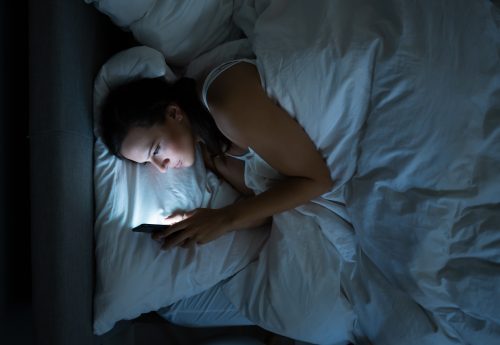Mass Eye and Ear researchers have found that sleep disorders like sleep apnea can significantly impact the wages and overall health care costs of individuals and society at large.
Sleep disorders take a toll on one’s overall health and wellbeing. The disorders raise risk for a whole host of medical issues that can impact a person’s heart to their mental health. Now, new research finds sleep disorders can also significantly impact a person’s wallet.
A new study led by Mass Eye and Ear physicians Neil Bhattacharyya, MD, FACS, and Phillip Huyett, MD, found adults with sleep disorders earn on average about $2,500 less per year than adults without them and are more likely to be on supplemental income like Social Security and welfare.
“I was surprised at the magnitude of our findings,” Dr. Bhattacharyya, a comprehensive ENT at Mass Eye and Ear Longwood who studies epidemiology, told Focus. “If you multiply $2,500 a year over 10 to 20 years, that’s a lot of money.”
This is the second study led by Dr. Bhattacharyya and Dr. Huyett, director of Sleep Surgery at Mass Eye and Ear, that has examined the economic impact of sleep disorders like sleep apnea. Their research last year found that sleep disorders are associated with significantly higher rates of health care utilization, conservatively placing an additional $94.9 billion in costs each year to the United States health care system.
The two studies point to the societal impact of sleep disorders, and how they not only overburden the health care system but can directly impact the finances of those affected.
“I have seen patients who have literally lost their jobs because of sleep issues because they struggle and can’t function,” said Dr. Bhattacharyya. “It’s not just the sleep apnea, but also the comorbid effects on overall health taking a toll.”
Sleep disorders impact on overall health
 An estimated 13.6 million U.S. adults have a sleep disorder according to the researchers’ analysis. This figure is likely a dramatic underestimate because of millions of undiagnosed cases not factored into the study.
An estimated 13.6 million U.S. adults have a sleep disorder according to the researchers’ analysis. This figure is likely a dramatic underestimate because of millions of undiagnosed cases not factored into the study.
One of the most common sleep disorders is sleep apnea, in which a person’s breathing stops and restarts during sleep. This is caused by an obstructed airway that reduces airflow leading to drops in oxygen levels and wake ups from sleep, resulting in short-term quality of life impairment as well as long-term health consequences. Sleep apnea and other sleep disorders like insomnia often result in severe daytime consequences – sleepiness, mental fog, decreased school and workplace performance, and increased motor vehicle accidents. In the longer term, there is a significantly increased risk of health conditions including high blood pressure (hypertension), heart attacks and strokes. They can also impact mental health, resulting in difficulty concentrating and mood disorders like anxiety and depression. These consequences influence productivity in the workplace, increase absenteeism and early retirement.
“Greater recognition of sleep disorders and an early referral to a sleep specialist are essential to combat the personal and societal impact of sleep disorders,” said Dr. Huyett. “Your sleep is important, and if there’s an issue with your sleep, seek help for it.”
Examining the economic impact of poor sleep
Drs. Bhattacharyya and Huyett conducted their new study after seeing the impact poor sleep had on their patients.
In the new study, in the Journal of Clinical Sleep Medicine, Drs. Bhattacharyya and Huyett analyzed the 2018-19 Medical Expenditure Panel Survey, which is a nationally representative survey of more than 33,000 U.S. adults. The survey collected data from families, their doctors and their employers, and included sleep disorders such as sleep apnea, insomnia, hypersomnia, circadian rhythm sleep disorders, parasomnias, sleep-related movement disorders and narcolepsy.
A closer examination of the data revealed the direct financial impact sleep disorders can take on employment. People with sleep disorders earned, on average, $20,445 a year compared to $22,941 (after adjusting for many demographic and medical factors) earned by those without a sleep disorder. That’s an average annual wage decrease of $2,496.
“Think of a truck driver or wage worker who has a job that relies on them being alert, and how a sleep disorder might impact their financial wellbeing,” said Dr. Bhattacharyya. “They are more likely to lose their job or call out sick because of health conditions that relate to their poor sleep.”
“Furthermore, there are certain professions, including commercial truck drivers, where the sleep disorder actually completely eliminates the opportunity to work without clear documentation of effective treatment,” added Dr. Huyett.
A study published last year by the researchers, also in Journal of Clinical Sleep Medicine, found that individuals with sleep disorders tallied approximately 60 percent more in annual overall health care costs than those without a sleep disorders – about $7,000 more per year. On average, patients with sleep disorders attended more than 16 office visits and were prescribed nearly 40 medications per year, compared to nearly 9 visits and 22 prescriptions for those without a sleep disorder.
“The importance of high-quality sleep is strongly associated with daytime function and long-term health issues, and as our studies show there are financial ramifications as well,” said Dr. Huyett. “Between our two studies we see that individuals are getting hit at both ends— they are less likely to be employed, make less in salary and also spend more, specifically on health care-associated costs.”
Diagnosing and treating a sleep disorder
Restorative sleep is crucial for one’s overall health and wellbeing. The good news is that there are ways to treat sleep disorders effectively once a person is diagnosed.
Typically, a patient sees a doctor after they’ve either complained about poor sleep quality or their bedpartner has witnessed signs such as snoring, pauses in breathing or certain behaviors/movements during the night. There are also a new number of tools, such as smart watches and rings capable of monitoring sleep on smartphone apps. These tools can help determine whether a person’s sleep is impacted, prompting them to set up a visit with their doctor and pursue appropriate testing and treatment.
“The take-home message is that, if you’re struggling with not getting enough good-quality sleep, it’s not a trivial manner,” said Dr. Bhattacharyya. “Our research shows that sleep disorders are not simply a benign nuisance, but rather can have a significant on your health, wage-earning ability and employability.”



Thank you for more additional insight with another perspective.